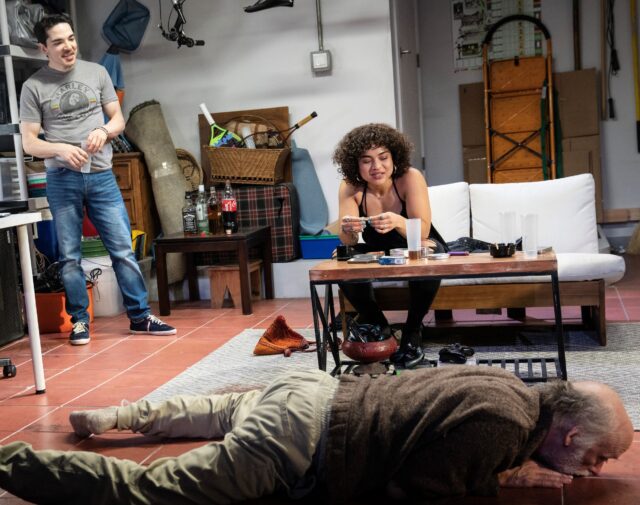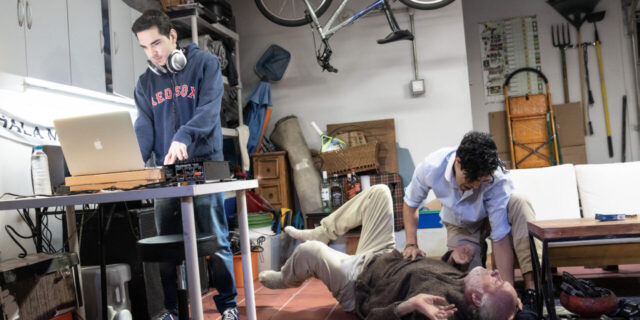
Frank Wood plays an ailing golden retriever in Danny Tejera’s Toros (photo by Joan Marcus)
TOROS
Second Stage Theater Uptown, McGinn/Cazale Theater
2162 Broadway at Seventy-Sixth St.
Through August 13, $60-$75
2st.com/shows/toros
Three twentysomething friends who attended the same international grade school in Madrid reconnect in Danny Tejera’s beguilingly quirky and unpredictable Toros. Juan (Juan Castano) is a wannabe DJ who works on his music in the garage. Toro (Abubakr Ali) has just returned from an unhappy stint in New York City. And the free-spirited Andrea (b) teaches kindergarten when she’s not rolling joints. All three live at home as they try to figure out what they want to do with their lives, spending their evenings drinking, smoking, going to clubs, and hoping there is something better out there.
All the while, Juan’s ailing, elderly golden retriever, Tica (Frank Wood), is curled up in her bed at the front corner of the stage. Throughout the show, she adjusts her positions, lets out small snores, howls, and barks, and moves awkwardly across the floor, her ancient bones wasting away. The dog soldiers on but is a constant reminder that everyone is eventually going to die, and it might be ugly and painful.
The bullheaded Juan — “toro” means bull in Spanish — is a nasty guy who is mean to Toro, unable to say anything kind. Toro is a lost soul who can’t decide whether he wants to be with his friends or be alone. Andrea is the only one of the trio who has a firm grasp of who she is, although the recent tragic death of her sister has her reevaluating her future. Another death impacts the way they interact with themselves and the world.
Tejera (Scary Faces Happy Faces) and director Gaye Taylor Upchurch (Wish You Were Here, Animal) don’t make it easy for the audience at Second Stage’s McGinn/Cazale Theater, but only in the best ways. Each of the characters has serious flaws and does things that they can’t take back even if they wanted to. The dialogue, which is mostly in English with occasional Spanish, crackles with unexpected lines.

Toro (Abubakr Ali) scratches Tica (Frank Wood) while Juan (Juan Castano) tends to his music in Toros (photo by Joan Marcus)
Set designer Arnulfo Maldonado has crafted an intricate and realistic garage, complete with a fancy car under a white sheet, gardening equipment, and a bathroom that continually overflows. Curiously, there is a wall of plants and trees right outside the garage, which would prevent the car from pulling out into the driveway; perhaps it’s meant to imply that the characters are trapped. (Juan and Toro work for Juan’s father’s real estate company, finding houses for others as they are still stuck living with their parents.)
On the subway home, we heard a few people who had been at the show questioning that scenic choice as well — the designer achieved a thought-provoking response, as do the unique writing, acting, and direction. I’ve seldom been on a train coming home from the theater with as many lively discussions going on.
Castano (A Parallelogram, Transfers), b (American (Tele)Visions, Unprincess Non-Bride), and Ali (We Live in Cairo, Kiss) are terrific as childhood friends who don’t necessarily have much in common anymore, but Wood steals the show as Tica, who is onstage nearly the entire smoothly paced ninety minutes. “Tica” can be translated as ethics, which is something that Juan can learn a lot about.
“All the things people usually want: money, or fame, or — raising a family or doing social work — I was just like, none of that seems that great or useful anyway, you know?” Toro says. “And — I just sort of like, stopped believing in reality. . . . Like, it just seemed like, no matter what I saw in front of me, it was all so obviously performed.”
There’s nothing obvious about the wonderfully performed Toros.
[Mark Rifkin is a Brooklyn-born, Manhattan-based writer and editor; you can follow him on Substack here.]